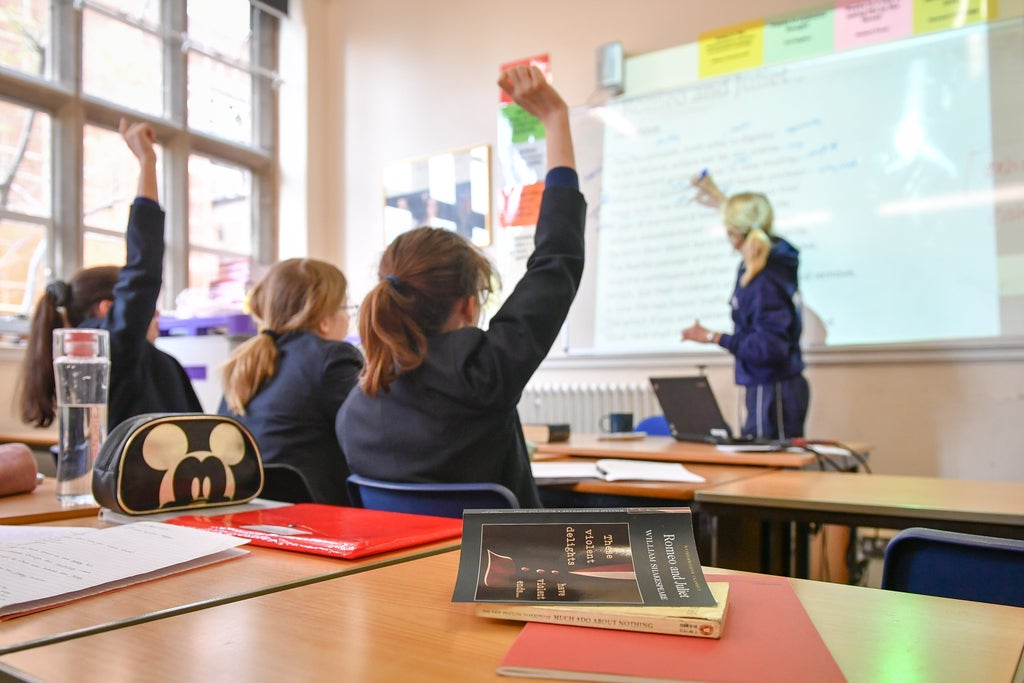
The company which runs the Government’s national tutoring programme has lost the contract for next year, the Department for Education has announced.
Randstad has been criticised by schools and tuition providers throughout its tenure for issues with bureaucracy and difficulties with its online portal.
Data released by the Government earlier in March showed just over 100,000 tuition courses had been started through this route during the 2021-22 academic year.
Critics have said Randstad’s management of the scheme is “dysfunctional”.
More than a million tuition courses have been started overall, but most of them were started under the schools-led route rather than through the controversial tuition partners route run by Randstad.
On Thursday, the Department for Education announced that schools will receive all tuition funding directly next year to “simplify” the programme.
A total of £349 million has been allocated for the scheme for 2022/23.
This will allow for much more effective tutoring which can be designed to meet the needs of the area, and enable every child to catch up on their lost learning
The DfE said: “This will simplify the system and give schools the freedom to decide how best to provide tutoring for their children, which could include one-on-one or small group tutoring through teachers or teaching assistants, or continuing to work with external tutoring specialists and academic mentors.”
The schools-led tutoring will support the “Parent Pledge” introduced in the Schools White Paper on Monday for any pupil falling behind in English and maths to be given additional help to catch up.
The DfE will launch a procurement process in April for new suppliers, who will be responsible for recruiting Academic Mentors as part of the programme and offering training to help schools in the use of their funding.
Schools will also be able to deliver tuition over the summer holidays, as the date for using tuition under the schools-led route has been extended to August 31.
Robert Halfon, chair of the Commons’ Education Select Committee, welcomed the move as he described Randstad’s management of the programme as “alarming”.
He said: “For many months now I have held debates in the House of Commons, and raised my concerns in the Education Committee, to call for fundamental reform of the catch-up programme, and for the Government to give more autonomy to schools to choose the catch-up programme best suited to their needs.
“Randstad’s delivery of the national tutoring programme has been particularly alarming.”
He added that a recent Education Committee report, Is The Catch Up Programme Fit For Purpose?, “highlighted significant problems that Randstad were only meeting 15% of its overall target, was not reaching the most disadvantaged pupils, and that there were growing regional disparities in take-up of the scheme”.
He added: “I strongly welcome the measures announced by the Government today which will remove Randstad as the delivery partner, and which will direct the tutoring funding directly to schools to organise their own provision under the school-led pillar of the catch-up programme.
“This will allow for much more effective tutoring which can be designed to meet the needs of the area, and enable every child to catch up on their lost learning.”
Geoff Barton, general secretary of the Association of School and College Leaders, said: “We welcome a restructuring of the national tuition programme so that all funding goes directly to schools.
“We have argued since the outset of the programme that this is what should happen and that the way it has been structured through various funding streams and providers is overly and unnecessarily complicated for something that should really be very simple.
“There is good evidence that small group tutoring helps students to progress, and it makes perfect sense for the entirety of the funding to go to schools so that they can decide how this would best be delivered.
“Experience has shown that by far the most popular route is through the use of existing staff rather than via private tutors. This is not surprising as existing staff know the students and their needs already, whereas private tutors do not.
“We await further details about exactly how this scheme will work next academic year.”
A key charity delivery partner of the tutoring programme said: “This is a welcome reset of the NTP and kudos to (Education Secretary Nadhim) Zahawi for listening.
“But to win the hearts and minds of the teaching profession he must appoint a trusted not-for-profit organisation to run the NTP. It’s time for the outsourcing companies to back off and let the education experts work their magic.”
Mr Zahawi said: “The national tutoring programme is transforming the way schools provide support for the children and young people who need it most, with 1.2 million courses now started across the country since the programme began.
“It’s also pivotal to the pledge I made to every parent as part of my Schools White Paper that if their child falls behind in English and maths, that child will receive the high-quality support they need to get back on track.
“It’s teachers and schools that know their pupils best, which is why we are building on the success of school-led tutoring so far – with evidence as our watchword – so that as many children and young people as possible can feel the huge benefits high-quality tutoring provides.”
Bridget Phillipson MP, Labour’s shadow education secretary, said: “The Conservatives’ flagship tutoring programme has failed our children and wasted millions of pounds of public money.”
“The Education Secretary is finally catching up but this is too little, too late for too many children.
“Labour’s ambitious recovery plan would deliver tutoring, breakfast and after-school clubs and mental health counsellors in every school, supporting every child to learn, play and develop.
“Children have been an afterthought for this Government. It’s time ministers matched Labour’s ambition for children’s futures.”







